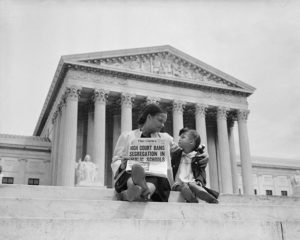Course Description

This course is an introduction to United States constitutional law history, theory, and practice. The course will address the history of the United States Constitution, the governmental structure that the Constitution creates, and the individual rights that it protects. In addition, the course will address the major approaches to interpreting the Constitution. Finally, the course will consider the history, theory and practice of litigating and adjudicating selected substantive Due Process rights, Equal Protection rights, and the Second Amendment right to bear arms.
The 2021 Lisbon University course begins on Monday, October 11, 2021 at 11:00 a.m. The course syllabus is available for download here: Ciolino Syllabus for 2021 Constitutional Interpretation Class.
Student Information Form
All students in the class need to fill out this information form: Lisbon Student Information Form. I will use the information from that form to assign cases for Thursday and Friday student presentations, and to collect final examinations.
Required Materials
- United States Constitution. Please download a PDF copy of the United States Constitution here: United States Constitution.
- Decisions of the United States Supreme Court. PDF copies of several reported decisions from the United States Supreme Court are linked below. Please download and read for our classes on Thursday and Friday.
Evaluation
Each student’s final grade will be based on a final examination. Each student must submit answers to the examination questions on or before November 15, 2021.
Upload your final answers using this form: Final Examination Submission (airtable.com)
Lectures
Class begins on Monday, October 11, 2021 at 11:00 a.m. Each class lecture is described in the table below. The instructor will present two, one-hour lectures each day from Monday through Friday. Students are encouraged to participate in class discussions and will be asked to make brief presentations on selected topics and cases on Thursday and Friday.

- Introduction. An introduction to the course. Constitutionalism in perspective. An overview of the history of the United States and the adoption of the United States Constitution. Slides.
- Governmental Structure. An overview of the governmental structure of the United States. States and federalism, the branches of the federal government, separation of powers, and checks and balances. Slides.
- Individual Rights. An overview of the history and theory of individual rights. The Constitution’s Bill of Rights. The First Amendment (establishment of religion; free exercise of religion; freedom of speech and assembly). The Second Amendment (the right to keep and bear arms). The Fifth Amendment (takings). Slides.
- Individual Rights. Constitutional criminal procedure. The Fourth Amendment (searches and seizures). The Fifth Amendment (grand jury indictment; double jeopardy; self-incrimination; due process). The Sixth Amendment (speedy and public trial; trial by jury; confrontation; compulsory process; assistance of counsel). The Eighth Amendment (excessive fines; cruel and unusual punishment). The Ninth and Tenth Amendments. Slides.
- Enforcing the Constitution. Judicial review. Motions to suppress and the exclusionary rule. Civil-rights litigation. Slides.
- Constitutional Interpretation. The problem of interpretation. The “Living Constitution.” Originalism. Slides.
 The Constitution in Action. Discussion of U.S. Supreme Court cases. Racial discrimination (Plessy v. Ferguson; Brown v. Board of Education). The right to keep and bear arms (District of Columbia v. Heller). Slides.
The Constitution in Action. Discussion of U.S. Supreme Court cases. Racial discrimination (Plessy v. Ferguson; Brown v. Board of Education). The right to keep and bear arms (District of Columbia v. Heller). Slides.- The Constitution in Action. Abortion (Griswold v. Connecticut; Roe v. Wade; Planned Parenthood v. Casey). Slides.
- The Constitution in Action. Same-Sex marriage (Obergefell v. Hodges). Slides.
- The Constitution in Action. Litigating and adjudicating the constitutionality of a hypothetical municipal ordinance forbidding dog ownership. Slides.
